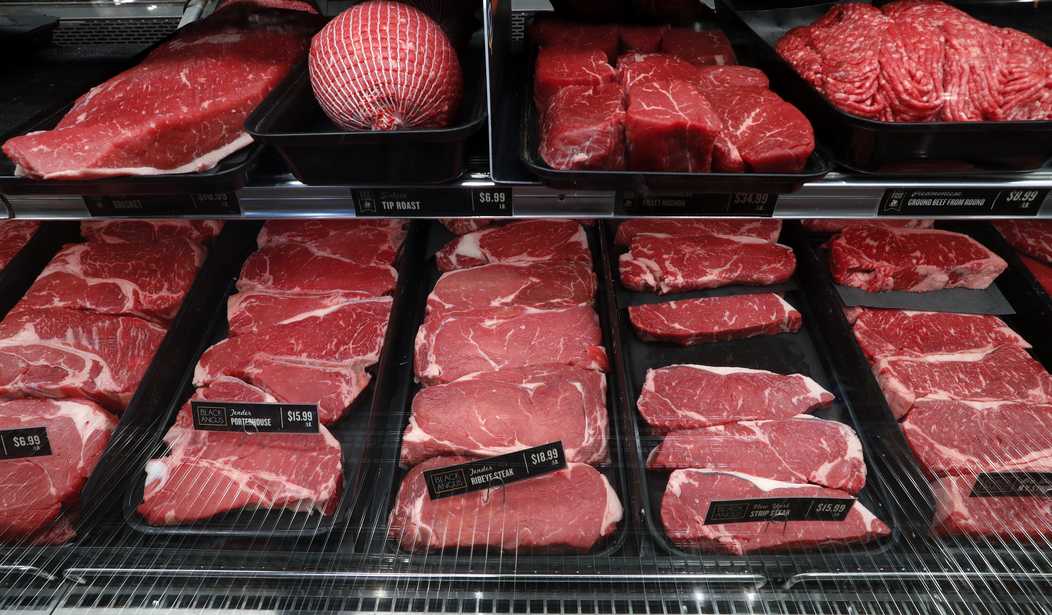Once again, the legacy media is trying to get us to change our ways to save the planet. Pro tip: We couldn't hurt the planet if we tried. The planet is 4.55 billion years old; its history and its systems are vast beyond our ability to easily understand. We can damage or even possibly eradicate ourselves, but we can't do the planet any long-term damage; let's just set that stupid argument aside up front.
Back to the legacy media. A piece published Wednesday in the Associated Press purports to give us some tips on reducing the emissions from our diets. There's just one problem:
They're bollocks.
First, there's this argument:
Maybe you’ve already heard the short answer to minimizing your diet’s impact on the planet: eat more plants and fewer animals. The data backs up that suggestion. Emissions from meat-rich diets are four times higher than that of vegan diets.
Thanks, no. The only way the climate scolds can arrive at that figure is by factoring in the belches and flatulence of farm animals, and it is belaboring the obvious to quite an extreme degree to note that there have always been animals around, and they have always been belching and breaking wind; more on that in a moment. And before the "OMG VEGAN GOOD" crowd chimes in, nobody cares what anyone eats or doesn't eat, so long as they mind their own business and don't bother the rest of us. I'm not talking about vegetarians or even vegans by choice; an old friend of mine is a practicing vegan because he feels better while on that diet, but he doesn't give two hoots if you eat a steak in front of him. And any biologist will tell you that humans are remarkably suited to be omnivores. Our digestive systems are basically garbage disposals; we can turn a wide variety of foods into energy.
Second, there is the old chicken vs. beef story:
Swapping one serving of chicken per day for beef cuts a diet’s emissions nearly in half. Ruminant animals such as cows, sheep and goats are the top drivers of emissions.
Those animals “are associated not only with nitrous oxide emissions, but they’re also related to direct methane emissions because they burp them up while they digest food,” said Marco Springmann, professorial research fellow in climate change, food systems and health at University College London.
Again, thanks, no. Ruminant animals, you say? How about bison? A couple of hundred years ago, there were estimated to be 65 million bison roaming the Great Plains; some estimates go as high as 10 billion, but I find the 65 million estimate more likely. This huge ruminants roamed the grasslands of the West for many thousands of years, eating and belching when and where they pleased, and there doesn't seem to have been any drastic change in climate other than the one caused by the ending of the Wisconsonian glaciation. For comparisons, by the way, there are roughly 28 million beef cattle in the United States today. If we want to be generous and include all cattle, the number jumps to 92 million. That's on the low end of the estimates of the number of bison, which are larger, eat more, and presumably break wind more.
Finally, let's look at this claim:
“Rice uses a ton of water. It uses gobs of fertilizer. There’s flooded rice paddy fields, and that water actually breeds all kinds of bacteria, and those bacteria produce methane gas,” said eco-dietitian nutritionist Mary Purdy.
Apparently, Mary Purdy has never heard of the hydrologic cycle.
The "water" argument is a common one among "ethical vegan" activists and climate scolds alike; they seem to be laboring under the misapprehension that water, once taken up by a plant or ingested by an animal, just disappears. Presumably, they also think that new water is somehow generated elsewhere, to make up the loss, or at least some of it. But as even the weariest river winds somewhere safe to sea, so too does the hydrocycle work its wonders; water is consumed, passed, evaporates, moves into the groundwater, moves into the atmosphere, falls as rain, in a great, complex cycle - but it doesn't just vanish.
Normally, I would caution the AP to stop wasting our time with this horse squeeze, but it's fun to debunk it, and we've had enough serious news lately.
See Also: This Is Good: CO2 Causes Plant Growth, Global Greening
Liberal Seattle Paper Cries About Climate Change Causing Flooding. They're Wrong.
So here are my tips for you, good readers, on diet: Eat what you like. Eat in moderation, avoid processed and preservative-laden foods. Eat fresh foods, prepared with your own hands. And get outdoors once in a while. Go for a walk. Look at the environment that most of the climate scolds never see.
That will do you and the planet far more good than agonizing over a few tenths of a degree of warming over the next 20 years.














